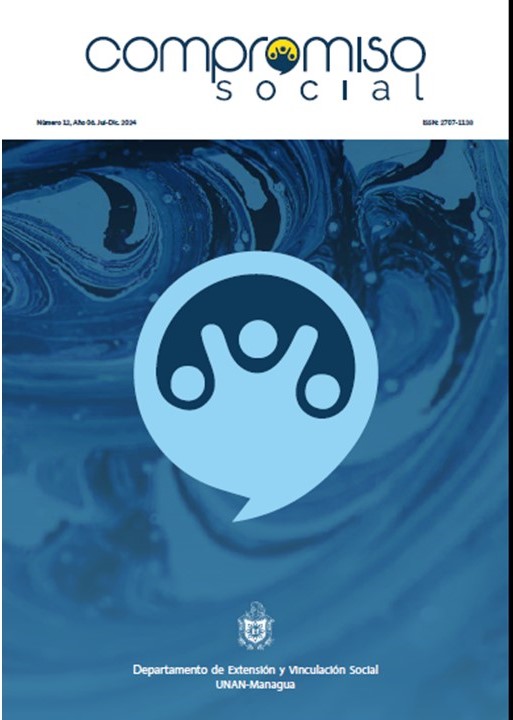Articulación de la formación, investigación y extensión en la educación integral de los estudiantes universitarios
DOI:
https://doi.org/10.5377/recoso.v7i12.19655Palabras clave:
Formación, investigación, extensión, educación integral, contextoResumen
La educación integral de los estudiantes universitarios es una prioridad para las instituciones de educación superior, pues es primordial para su desarrollo personal y profesional. El presente estudio se realizó en la Universidad Nacional Francisco Luis Espinoza Pineda (UNFLEP) en el año 2024, teniendo como objetivo analizar la articulación de la formación, investigación y extensión universitaria en el desarrollo integral de los estudiantes, evaluando cómo estos procesos contribuyen a la formación y al fomento de habilidades críticas y creativas para enfrentar retos sociales, económicos y culturales. El proceso investigativo se desarrolló con un enfoque cuantitativo. Para el análisis de la información se aplicó la técnica de encuesta semiestructurada, con una muestra de 357 estudiantes de las diferentes carreras que oferta la universidad. Las variables estudiadas incluyeron acceso a la educación, relevancia de la formación profesional y el rol de la extensión universitaria como vínculo con la comunidad. Una vez aplicada la encuesta se procesó la información mediante el programa de Microsoft Excel. Los resultados demuestran que hay un impacto en habilidades prácticas, pensamiento crítico y responsabilidad social; mostrando resultados positivos en la empleabilidad y en el vínculo con las comunidades. Se concluye que la integración de formación, investigación y extensión potencia el aprendizaje significativo y prepara a los estudiantes para enfrentar desafíos en su entorno laboral.
1037
Citas
Alarcón Ortiz, A., Guzmán Mirás, Y., y García González, M. (2019). Formación integral en la educación superior: una visión cubana. La Habana, Cuba. http://scielo.sld.cu/scielo.php?pid=S2308-01322019000300010&script=sci_arttext
Álvarez Gómez, G. A., Viteri Moya, R., Viteri Intriago, D. A., y Estupiñán Ricardo, J. (2021). Integración de los procesos sustantivos para la mejora de la calidad del aprendizaje. Cienfuegos, Cuba. http://scielo.sld.cu/scielo.php?pid=S1990-86442021000300021&script=sci_arttext&tlng=pt
Arias-Gómez, J., Villasís-Keever, M. Á., y Miranda Novales, M. G. (2016). El protocolo de investigación III: la población de estudio. Ciudad de México, México. https://www.redalyc.org/pdf/4867/486755023011.pdf
Babativa Novoa, C. A. (2017). Investigación cuantitativa. Bogotá, Colombia. https://digitk.areandina.edu.co/server/api/core/bitstreams/30b26254-a8d2-4cd6-b44f-e107d90d3e6f/content
Buquet Corleto, A. G. (2011). Transversalización de la perspectiva de género en la educación superior: Problemas conceptuales y prácticos. Perfiles educativos, 33 (SPE), 211-225
Castro - Zapata, E. I., Guateque - Londoño, J. F., y Londoño - Bonilla, P. (2022). Importancia y relación entre la educación integral, la calidad y la equidad educativa, y el directivo docente. Colombia. https://revedupe.unicesmag.edu.co/index.php/EDUPE/article/view/283/546
Guerra, Y. M., Mórtigo Rubio, A. M., y Berdugo Silva, N. C. (2013). Formación integral, importancia de formar pensando en todas las dimensiones del ser. https://dialnet.unirioja.es/descarga/articulo/5386176.pdf
Lomelí-Parga, A. M., López-Padilla, M. G., y Valenzuela-González, J. R. (2016). Autoestima, motivación e inteligencia emocional: Tres factores influyentes en el diseño exitoso de un proyecto de vida de jóvenes estudiantes de
educación media. México. https://www.scielo.sa.cr/pdf/ree/v20n2/1409-4258-ree-20-02-00056.pdf.
López Tejeda, V., y Pérez Guarachi, J. F. (2011). Técnicas de recopilación de datos en la investigación científica. La Paz, Bolivia. http://revistasbolivianas.umsa.bo/scielo.php?pid=S2304-37682011000700008&script=sci_arttext&tlng=es
Martínez Moreno, A. R., Alonso Gatell, A., y Pérez Ramírez, E. (2021). La formación integral del estudiante universitario desde un enfoque sociocultural. La Habana, Cuba. http://scielo.sld.cu/scielo.php?pid=S0257-43142021000200001&script=sci_arttext&tlng=pt
Monge Hernández, C. (2022). Aportes de la extensión universitaria a la formación estudiantil: estudio de caso de la Universidad Nacional de Rosario (UNR), Argentina. Rosario, Argentina. https://revistas.uncu.edu.ar/ojs3/index.php/saberesypracticas/article/view/5773/4745
Ovira Álvarez, Y., López Calichs, E., y Rojas Valdés, A. (2022). La formación de estudiantes universitarios para la promoción de la lectura: aportes desde una concepción extensionista. Mendive. Revista de Educación, Rev. Mendive
vol.20 no.1 Pinar del Río ene.-mar. 2022 Epub 02-Mar-2022 http://scielo.sld.cu/scielo.php?pid=S1815-76962022000100123&script=sci_arttext
Rovira Álvarez, Y., López Calichs, E., Rojas Valdés, A.,y Gilimas Siles, A. M. (2022). La formación de estudiantes universitarios para la promoción de la lectura: aportes desde una concepción extensionista. Pinar del Río, Cuba. http://scielo.sld.cu/scielo.php?pid=S1815-76962022000100123&script=sci_arttext
Vallejo, R., Camacho, H., y Finol de Franco, M. (2010). Responsabilidad social como principio para la gestión del proyecto educativo integral comunitaria. Revista Multiciencias, 10 (1), 37-44.
Veiga de Cabo, J., De la Fuente Díez, E., y Zimmermann Verdejo, M. (2008). Modelos de estudios en investigación aplicada: conceptos y criterios para el diseño. Madrid, España. https://scielo.isciii.es/scielo.php?pid=S0465-546X2008000100011&script=sci_arttext




